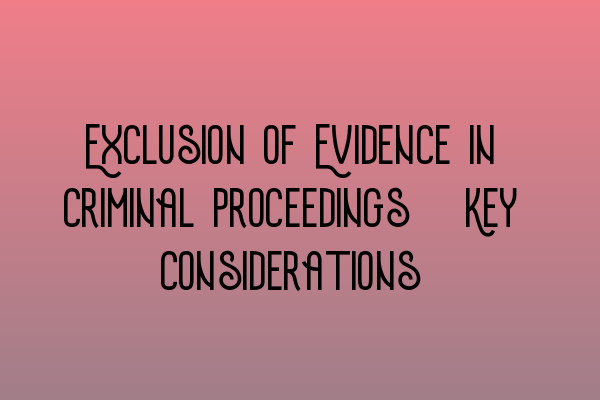Exclusion of Evidence in Criminal Proceedings: Key Considerations
In criminal proceedings, the evidence presented plays a crucial role in determining the outcome of a case. However, there are situations where evidence may be excluded from being presented in court. This article will discuss the key considerations when it comes to the exclusion of evidence in criminal proceedings.
1. Admissibility of Evidence
Before discussing the exclusion of evidence, it’s important to understand the concept of admissibility. Admissible evidence refers to evidence that is legally acceptable in court. This means that it must follow certain rules and procedures for it to be considered admissible.
Common reasons for evidence being deemed inadmissible include:
- Incompetence or unlawfulness of the evidence gathering process
- Breaches of the defendant’s rights
- Relevance and materiality
- Opinion or hearsay evidence
For a better understanding of the rules of admissibility, you can refer to our SQE 1 Preparation Courses which cover this topic extensively.
2. Exclusionary Rules
Exclusionary rules, such as the “exclusionary rule” and the “fruit of the poisonous tree doctrine,” are legal principles that guide the exclusion of evidence in criminal proceedings. These rules aim to deter law enforcement from engaging in misconduct during the collection of evidence.
The exclusionary rule prohibits the admission of evidence obtained illegally or in violation of the defendant’s rights. This rule maintains the integrity of the criminal justice system by ensuring that unlawfully obtained evidence does not influence the outcome of a case.
The fruit of the poisonous tree doctrine extends the exclusionary rule by excluding evidence that is derived from illegally obtained evidence. The doctrine prevents law enforcement from benefiting from their misconduct and discourages future violations.
To learn more about exclusionary rules, take a look at our article on SQE 1 Practice Exam Questions.
3. Balancing Tests
In some cases, there may be a need to balance the interests of justice against the exclusion of evidence. Various tests, such as the “probative value versus prejudicial effect test” and the “public interest test,” help determine the admissibility of evidence in such situations.
The probative value versus prejudicial effect test considers whether the evidence is necessary to prove the guilt or innocence of the accused and whether its value outweighs any potential prejudice it may cause.
The public interest test assesses the impact on public confidence in the criminal justice system if the evidence is excluded. It takes into account factors such as the seriousness of the offense, the reliability of the evidence, and the overall impact on the fairness of the trial.
If you want to practice applying these balancing tests, our SQE 1 Practice Mocks FLK1 FLK2 can provide you with realistic scenarios.
4. Discretionary Exclusion
There are instances when the court has discretionary powers to exclude evidence based on fairness and the interests of justice. The court may exercise this power to maintain the integrity of the judicial process and prevent unfair prejudice against the defendant.
Discretionary exclusion can occur when:
- The evidence was obtained improperly but not unlawfully
- The evidence is too prejudicial or inflammatory
- The evidence is redundant or cumulative
To further understand the concept of discretionary exclusion, you can refer to our SQE 2 Preparation Courses.
Conclusion
Exclusion of evidence in criminal proceedings is a complex issue that requires a careful analysis of various factors. Understanding the rules of admissibility, the application of exclusionary rules, and the balancing of interests are vital for both prosecutors and defense attorneys.
If you’re preparing for the SRA SQE exams, it’s essential to have a solid understanding of the exclusion of evidence, as it is a significant aspect of criminal law and practice. Make sure to check out our related articles and courses to enhance your knowledge and improve your chances of success:
- SQE 1 Practice Exam Questions
- SQE 1 Practice Mocks FLK1 FLK2
- SQE 2 Preparation Courses
- SQE 1 Preparation Courses
- SRA SQE Exam Dates
For further assistance and guidance in your preparation, feel free to contact our team at SQE Criminal Law & Practice Law UK. Good luck with your studies!
